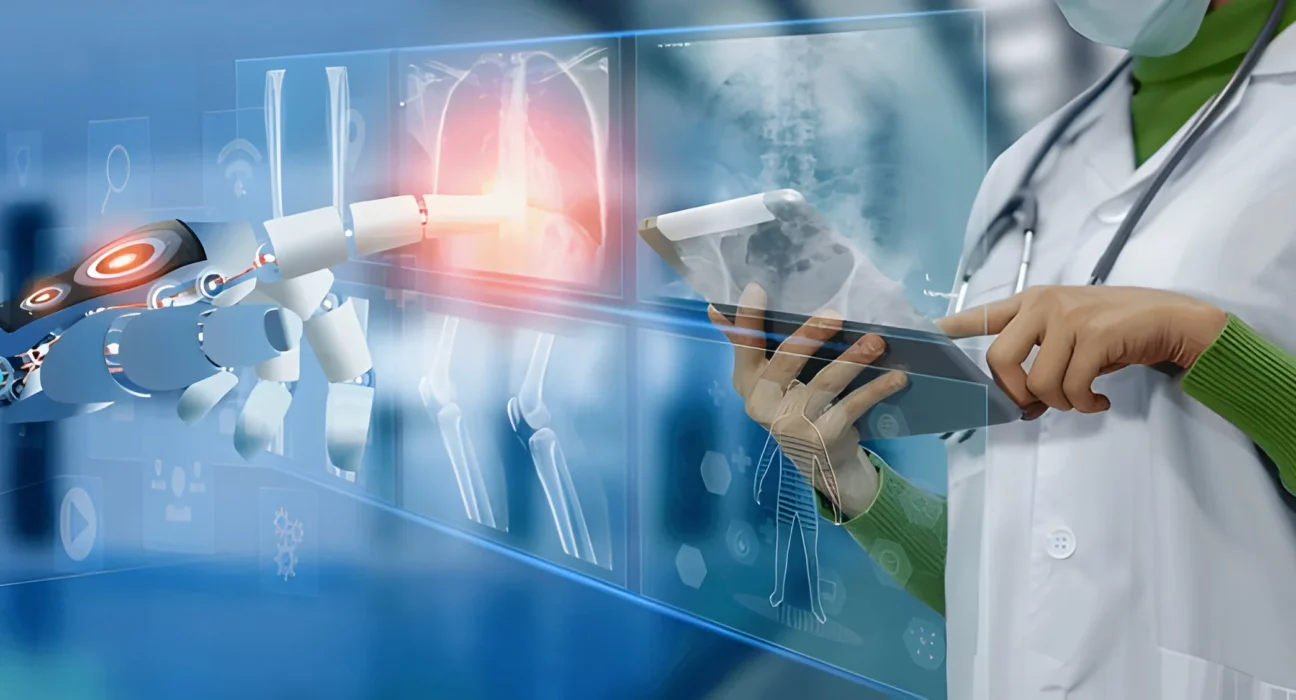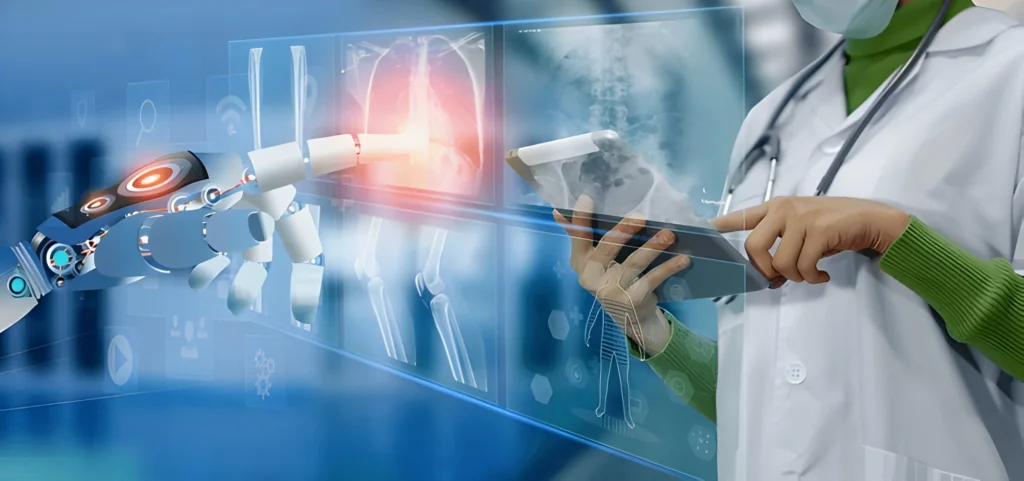20 Benefits of Artificial Intelligence in Healthcare: Revolutionizing Medicine

HealthAI has revolutionized patient care in recent times by implementing advanced AI technologies that improve the delivery of health services, enhance the process of diagnosis, and optimize process management. From predictive analytics to robotic surgery, AI is now being used in healthcare in previously unimaginable ways. We are enumerating 20 benefits of artificial intelligence in the healthcare industry and showing the reader how AI is revolutionizing this important sector.
1. Enhanced Diagnostic Performance
Perhaps one of the areas that impact healthcare delivery the most is the artificial intelligence systems for diagnosis. Machine learning can process medical images, laboratory findings, and patient information quickly and accurately to help clinicians manage the early detection of diseases, cancers, diabetes, heart problems, and more.
2. More Effective Treatment Approaches
AI can sort through and process a lot of data to suggest optimal treatment procedures for the patients’ genetically specified information, previous illness history, and other factors. Such practices enhance the rate of success of treatments as the patients are given medication that is most suitable for them.
3. Drug Development Aids
Drugs already proven to be marketable are further tested in silico or by computer due to Artificial intelligence systems in biomedical research. These help in forecasting the interaction of various molecules with biological entities, thus shortening the stage of drug discovery. This will also decrease the cost and the length of the process to demonstrate novel drugs into the market, and therefore the time a patient has to wait for the required medicine is reduced.
4. Improved Radiology and Imaging
AI in healthcare equally improves radiology and image interpretation by processing CT scans, MRI images, and X-rays more quickly and accurately. Artificial intelligence is capable of recognizing features or irregularities that may escape even the best-trained human eyes and thus enable the detection of specific conditions such as tumors or fractures.
5. Predictive Analytics for Patient Outcomes
Artificial intelligence and machine learning algorithms can analyze and predict individual patient outcomes from past data, which is useful information for providers and healthcare systems. This helps in foreseeing the risk of complications being incurred, the chances of the patient being readmitted as well as the likelihood of success of various treatments hence improving the management of the patients.
6. Lower Administrative Work
AI applications may supervise the performance of some administrative duties repeatedly without requiring much help namely, appointment reminders, patient records, and even billing. With the reduction of these responsibilities, healthcare providers will be able to attend to patients more leading to decreased exhaustion and heightened productivity.
7. Telemedicine and virtual health assistants
Virtual health assistants that employ AI technology enable users to take part in an interactive process in connection with disorders by offering guidance and directions on health maintenance, reminders on medication, and diet plans. This is very helpful in telemedicine whereby patients interact with health care providers without stepping into the clinic.
8. Early Diagnosis of Diseases At Risk
AI can evaluate genetic and patient records efficiently to look for risk factors in diseases and the reasons behind those diseases. For example, using this capability, it is possible to address the likelihood of Alzheimer’s disease, heart disease, or even some types of cancer before any signs become apparent.
9. Improved Surgical Interventions
AI robotics surgery has for instance been found to enable the performance of delicate operations with greater control than the human hands can be able to. Complications are reduced, the time taken to recover after operations is shorter, and even surgical effectiveness gets enhanced in a case where neurosurgery is involved as this is a delicate area.
10. Efficient Workflow Management
Thanks to AI, predictions can be made concerning the number of patients that will come in a given period, resources that will be needed, and how staff schedules will be managed to avoid cases of overworked employees, making hospital systems effective. This helps reduce the time patients spend waiting and hence makes the overall satisfaction of the patients in the hospital system better.
11. Minimized Error Carrying
While handling the majority of the responsibilities, AI remains the core reason for combating errors that stem from the healthcare system doing things manually. AI performs its task flawlessly whether it is prescribing medicine, inputting information into computers, or conducting imaging tests due to its rationalism which helps evacuate the room for error-orientated factors.
12. Continuous Monitoring of Patients with chronic illness
For instance, diabetic patients or heart patients are not going to have to go back to the doctor’s office as a swathe of technological AI-powered devices and sensors can take their place to some extent. Such devices are capable of transmitting that information in real-time to the concerned health providers, encouraging better management of the disease.
13. Mental Health Care Improvement
Application based on AI Chatbots and other mental health applications helps patients and even self-administer procedures such as cognitive behavioral therapy (CBT) techniques and acts as a mood monitor. This acts as a highly useful adjunct in mental health care, particularly spa in areas that do not have enough professionals to care for mental issues.
14. Clinical Studies Management
Artificial Intelligence helps choose people for clinical studies, handles patient databases, and selects appropriate studies for patients. This makes recruitment faster and minimizes the chances of failure in the trials by making sure that the appropriate patients are involved.
15. Management of Resources
AI can also enhance the management of resources in hospitals like beds, equipment, and even human resource management. Predictive studies assist hospitals in providing for the patient’s needs and filling the gaps that would have otherwise been left empty, ensuring that patients do not have to wait long before receiving their services.
16. Breakthroughs in Medical Research
With virtually endless amounts of big data provided by medical research work, AI helps sifts through and analyze these to come up with unique trends and ideas for possible solutions. This enhances the speed at which scientists make discoveries and hence enhances the level of knowledge in medical terminology.
17. Better Data Safety
The AI systems also would help in the prevention of further threats to the systems containing sensitive information about the patients. Since cyber security has become a great concern and the healthcare sector is one of the vulnerable centers, AI helps to support the security and privacy of medical records.
18. Continuous Learning for Healthcare Providers
Lifelong Learning for Healthcare Professionals AI algorithms associated with healthcare can be able to keep healthcare practitioners up to date through current studies in medicine, complex procedures, and recommendations. This ongoing learning further furnishes the physicians with the relevant information hence the right choices for the patients’ welfare.
19. Cost Reduction in Healthcare
A decrease in the overall cost of healthcare hospitals and healthcare systems has witnessed a reduction in ‘healthcare’ costs due to increasing process efficiencies, a decline in errors and waste, and other optimizing process improvements. The operations of hospitals and clinics become more cost-effective, and the treatment options available to patients become cheaper and easier to access.
20. Greater Patient Engagement
Increased Patient Participation In Healthcare Patients receive information and tools focused on their health and health-related tasks through electronic devices thus they are in a good position to manage their health. Better patient perception will result in better patient health outcomes.
Conclusion
Artificial intelligence is shaping the future of healthcare with the tremendous provision of tools to improve diagnosis, treatment, and management of operations. Artificial intelligence can help with a variety of tasks in the healthcare sector from reducing errors that are even human to the ability to discover diseases long before their clinical manifestations. As time will show, the more the progress of developments related to artificial intelligence, the more important this component will be in healthcare in the form of making the provision of medical services less time-consuming, easier, and more effective.
Through the adoption of AI, it is expected that the healthcare sector will render better services than before, improve health conditions better than before, and produce results more than before with lower expenses, improved efficiency, and elevated patient satisfaction levels.







